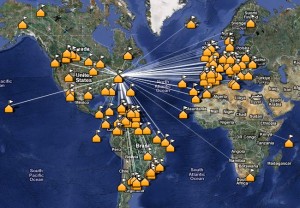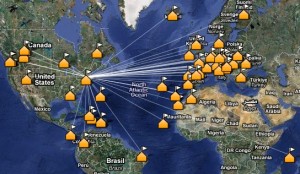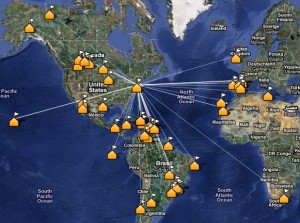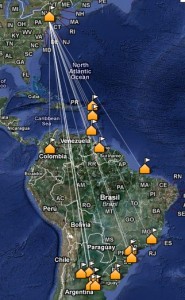Did a little analysis on this weekends ARRL SSB Sweepstakes.
The exchange for sweepstakes is not short and goes something like this with a fictitious op:
Me: CQ sweepstakes from kilo-two-delta-sierra-lima kilo-two-delta-sierra-lima sweepstakes
Op: kil0-seven-zulu-yankee-xray
Me: kilo-seven-zulu-yankee-xray thank you 123 alpha from k2dsl check zero-seven northern new jersey
Op: k2dsl thanks 234 bravo from k7zyx check 98 new mexico
Me: QSL – QRZ sweeps from kilo-two-delta-sierra-lima
When calling CQ on 80m, my best 10 minute rate was 1.8 QSOs logged per minute using the above as a template for what we each said. That equates to 18 QSOs logged in 10 minutes. My best sustained 60 minute rate included the above 10 minute rate and was 1.32 QSOs logged per minute or 79 QSOs logged in 60 minutes. You don’t really have a moment to even take a drink.
I had voice recordings for my call and for CQ. Next time if I’m going to put in a good effort, I will look to record the repetitive portion of the report and have it played back vs spoken by me each time. I would say the other other ops call and serial number and then press the button to say “alpha from k2dsl check zero-seven northern new jersey”.
In analyzing the sections which I logged, the top 5 sections by number of contacts are:
| Section | # QSOs |
| MDC | 41 |
| VA | 37 |
| OH | 24 |
| IL | 23 |
| MN | 19 |
The following sections had only 1 contact logged:
| Section |
| MS |
| ID |
| SB |
| SDG |
| PR |
| NE |
| MB |
| ND |
There were 6 DE stations logged and that would mean almost every operator in the state of Delaware was active in the contest. I logged 5 WV stations which seems a lot since West Virginia is usually not as well represented when looking for states/sections. The same goes for the 4 different WY stations logged as Wyoming is usually one you’re desperately searching for. I also logged 3 VI (Virgin Island) stations but one of those was from Guantanamo Bay when I was calling CQ for a short time on 20m.
Lastly, here’s a screenshot of a map showing the contacts made in the 2010 SSB Sweepstakes (click to enlarge):
73,
K2DSL





